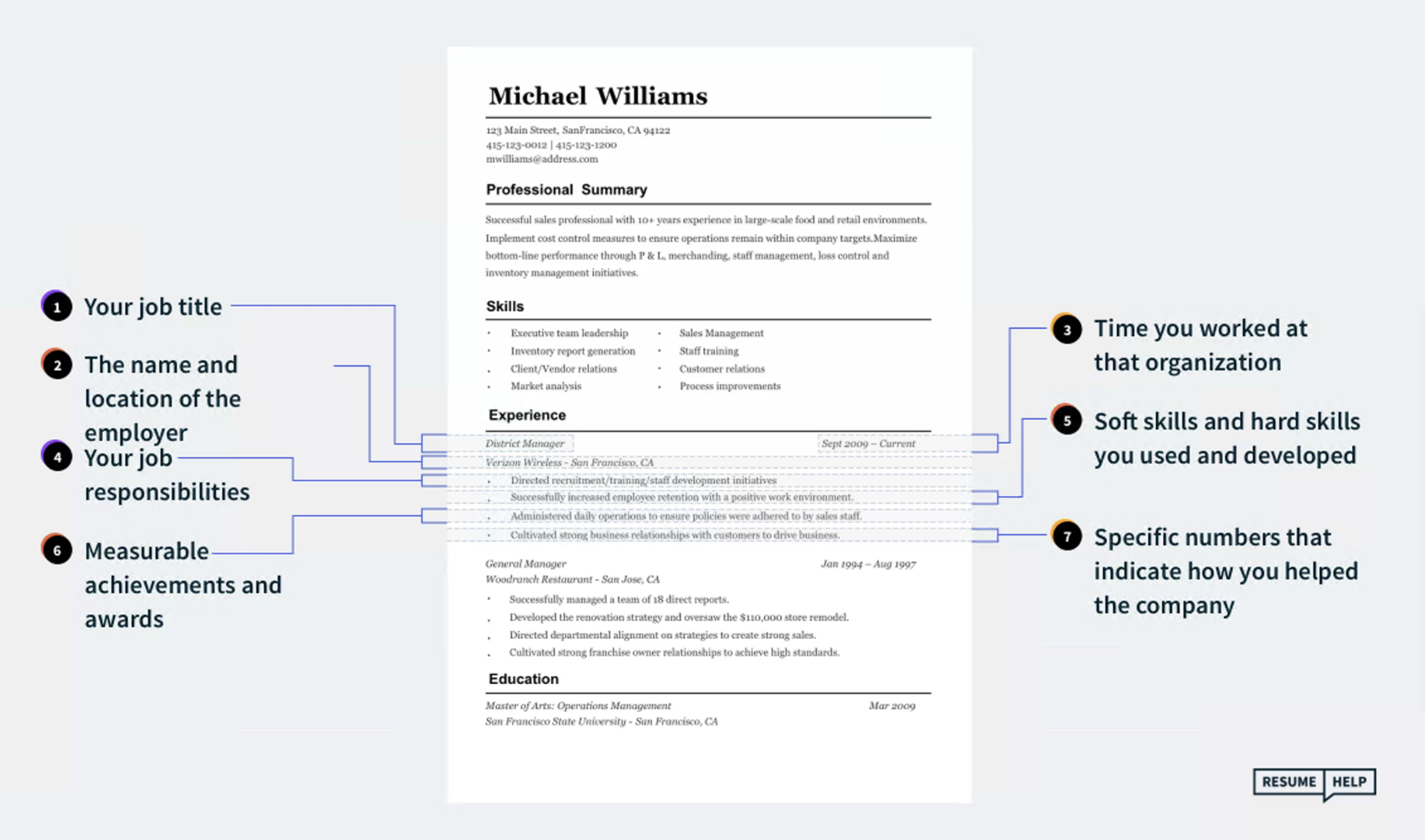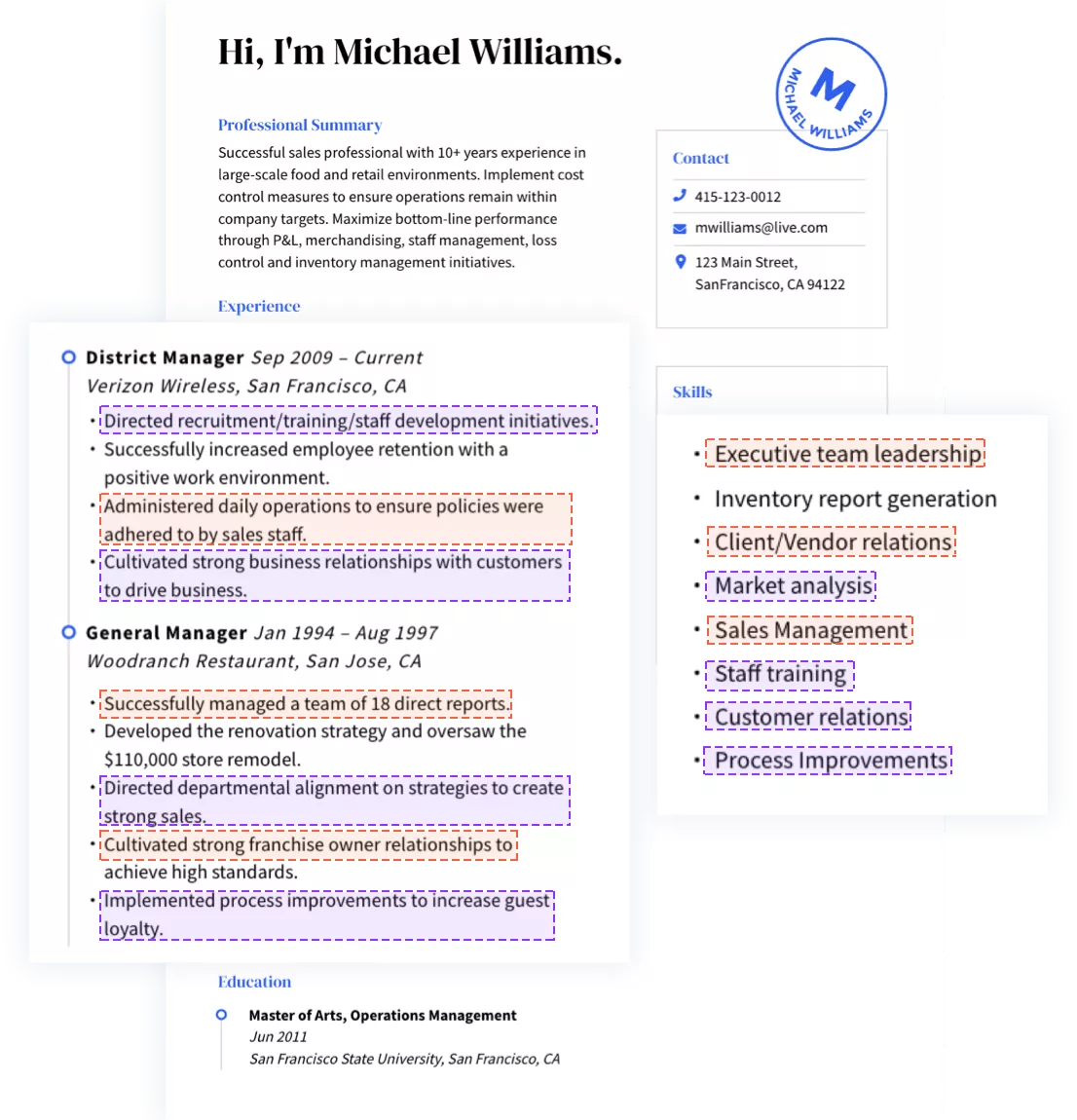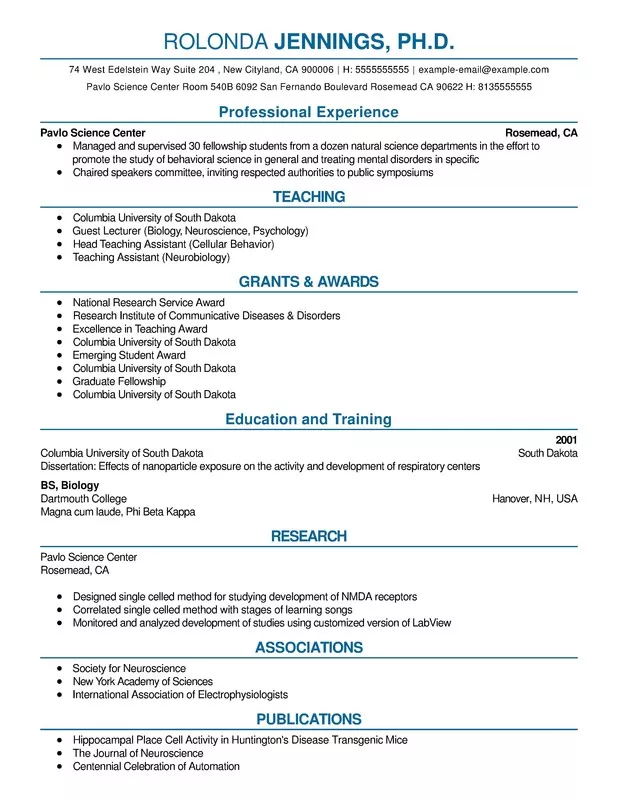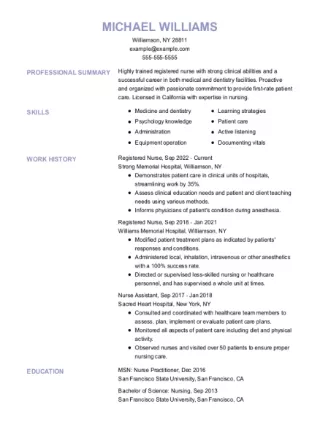How to Write Resume Job Descriptions (Tips and Examples)
Whether you’re writing a job description for a job posting or for your resume, follow our tips to write a powerful job description.
Our customers have been hired by*:*Foot Note

Job description
A job description — whether it’s in an internship or job posting, a resume or your LinkedIn profile — is key to understanding a job’s requirements and responsibilities. As an employer putting together a job posting or a resume writer trying to capture your past job experiences, a solid job description is important to attract readers.
To help you put your best foot forward, this page will give you:
- Expert tips for employers on how to write a job description.
- Advice for resume writers on how to write a job description in their work history section.
What is a resume job description?
The exact definition of a job description will depend on who is asking.
If you’re a recruiter or hiring manager putting together a job ad, a job description is a straightforward description of a specific job’s duties, responsibilities and functions. It provides the job seeker with detailed information about the job that they can use to decide whether they have the skills, qualifications and experience to handle it. The job description also serves as a guideline for job seekers to write their resumes.
On the other hand, if you’re a job seeker writing a resume, a job description is what goes under a job title in your work history section. Through a list of three to five bullet points, you explain each job position’s accomplishments and major responsibilities to show hiring managers that you have experience and know what you’re doing.
The most important things to list
Now that you know what a resume job description is, how do you create one? In your work experience section, you’re going to include the following information for each of your past jobs:
Here’s an example of how a job description might look for your resume:
Build my resumeJob seekers: How to write a job description
Now that you know what a resume job description is for an employer, it’s time for you as the job seeker to translate the job description in your work experience section. You should include:
- Your job title
- The name and location of the employer
- Your dates of employment
- Your job responsibilities
- Soft skills and hard skills you used and developed
- Measurable achievements and awards
- Specific numbers that indicate how you helped the company
Here’s a sample of how a resume job description might look for a copywriter that stumbled upon the job posting example featured on this page during their job search:
Digital Copywriter / June 2020 – Aug 2022
Starlight POV, Tampa, FL
- Conceptualized over eight campaigns that successfully ran on Instagram, garnering more than 10K followers.
- Wrote original scripts for TikTok videos, following brand tone and guidelines.
- Proofread and edited an average of 15 artworks per day before sending to client for approval.
Note that the sentences are short and snappy, utilizing action verbs as often as possible. Optimize your job descriptions so that they provide as much information in as little time as possible. You can also use this tactic for writing about internships.
For more help creating your work history section along with the rest of your resume, use our Resume Builder.
Connecting your job descriptions to other elements of your resume
How do you ensure your job descriptions look like they fit in that section of your resume? First of all, use the same skill words that you see in the job description. These are resume keywords, and using them reflects an image that the recruiter is actually trying to see. Hiring managers want to know that your work history and general job application are full of the skills that they’re actually looking for. Plus, it’ll help you get through applicant tracking systems (ATS) that employers often use to scan resumes.
Next, it’s a good idea to use your job descriptions to prove your skill set. If you say that you have great communication skills in your skill section, you want to also show that you’ve used those communication skills in previous jobs. Otherwise, the recruiter has nothing to go on as evidence you’re actually using those skills.
Lastly, tie your cover letter and your resume together. If you mention specific percentages in your resume, you can point to those percentages in your cover letter as well. It always pays to be consistent in your job application.
Build my resumeMore resume tips
ResumeHelp has dozens of articles and expert resources on how to put together a professional resume, as well as career advice. From templates to examples, we have everything you need to make your job application shine.
- Resume Design: Get all the tips and tricks to polish your resume.
- Cover Letter Templates: Find the perfect visual match for your resume.
- Resume Formats: Understanding the resume formats is the first step to writing a perfect resume.
- Resume Templates: Choose from our beautiful ATS-friendly templates to create your resume.
- Resume Examples: Find inspiration in our library of expert resume samples.
- How to Write a Resume: Use our professional guidelines to write an impressive resume.
- Resume Summary: Do you have more than three years of experience? Polish your professional summary with our advice.
- Resume Objective: An objective statement is a great tool for job seekers with less than two years of experience. Here’s how to write one.
- Education On Resume: Capture your education credentials correctly with our expert advice.
FAQ: Resume Job Descriptions
Have questions? We’re here to help.
What’s the difference between a resume job description and a corporate job description?
In simpler terms, a resume job description showcases what you did for a company, while a corporate job description showcases what a company wants. A resume job description will be located in the work history section of your resume. Each job title will have three to five bullet points, detailing your accomplishments and major job responsibilities.
What is an example of a job description?
Some examples of a job description for a resume will look like this:
- Managed distribution of email blasts to 200,000 subscribers that contributed to 50% of quarterly sales targets.
- Led team of 11 content creators that produced 500 new product listings each week.
Note in these examples how the job seeker uses active verbs (“managed”, “led”) along with specific numbers (“produced 500 new product listings each week”) to show how effective she is in the role.
How much resume job experience should I list?
You should typically list up to the last 10 years of experience in your resume. Experience that dates back longer than that is less likely to matter to employers unless they’re seeking someone with extensive experience. Usually, you should submit a one-page resume but it’s OK to have a resume that’s two pages long if you have a wide range of important work experiences to highlight.
Remember to list your relevant experience in reverse chronological order so that a potential employer sees the most recent, most relevant job experience first.
How do I use a resume job description to connect seemingly non-relevant work experience?
Even if you were in a completely different field, you may have a transferable skill set that applies to the new job.
Connect your past work experience, and the duties and responsibilities written in the potential employer’s job description. If they’re looking for a project manager with strong communication skills, include bullet points in your work experience that show the recruiter or hiring manager how great you are at managing others and what you’ve done in the past that showcases good communication.
The key is to tailor your resume to the job posting. Use the listed responsibilities and key requirements as a map to create a resume that speaks to your ability to work well.
Couldn't find the answer you're looking for?







